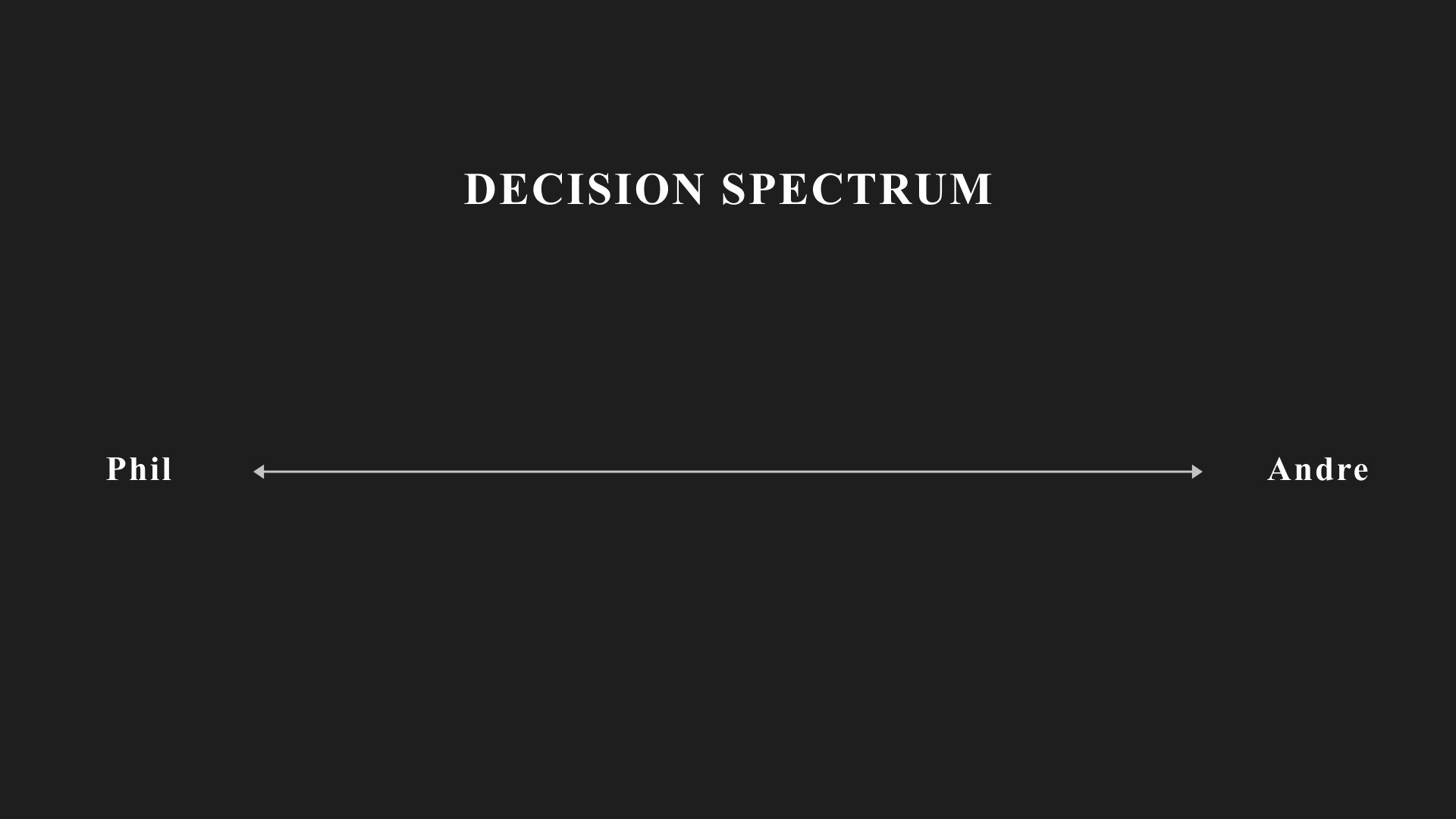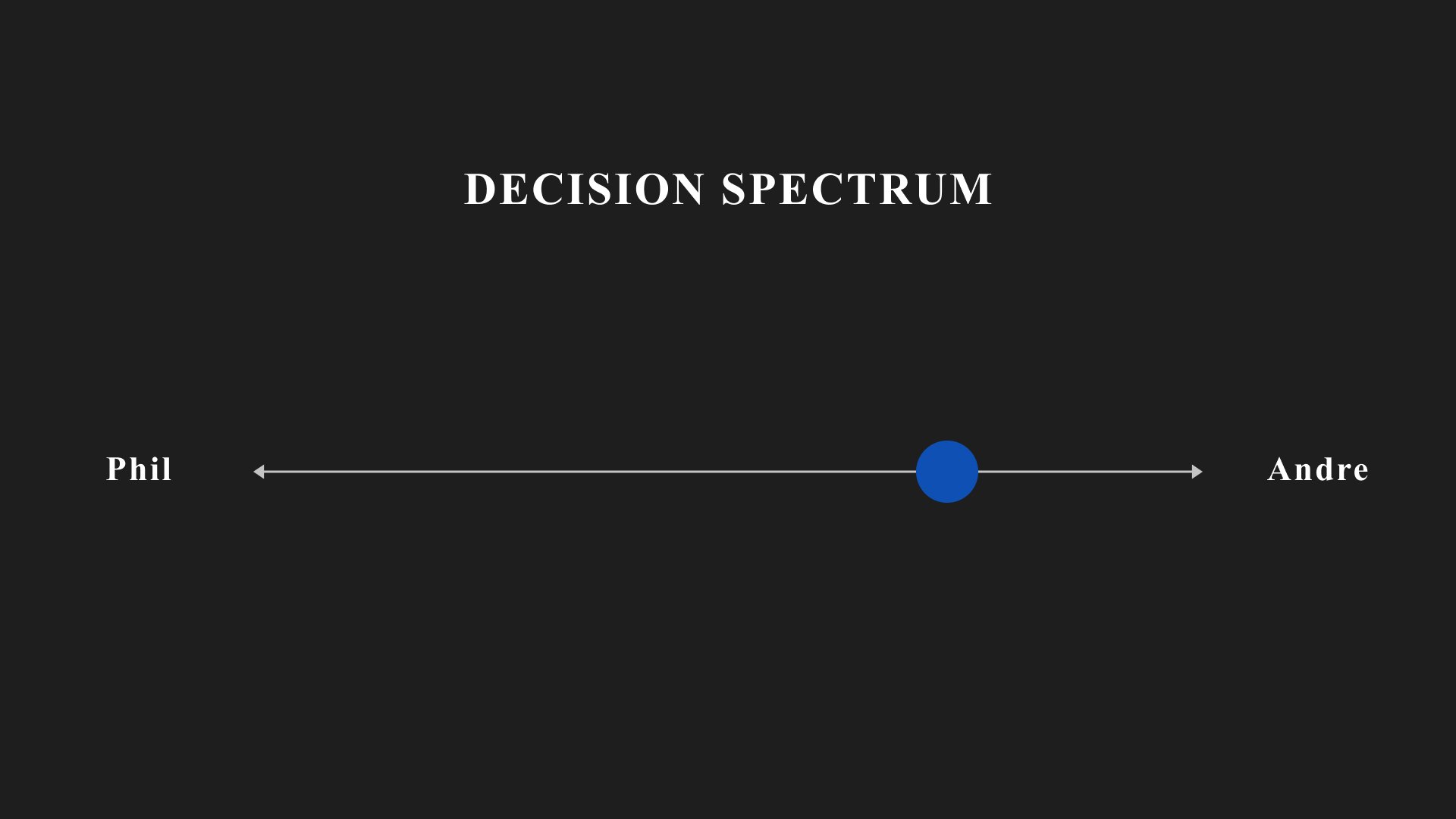The spectrum
You may have noticed the story of Phil and Andre was incredibly clear cut.
Phil = Traditionalist = Ineffective
Andre = Filmpreneur = Badass
But here’s where I confess to deliberately misleading you.
Truth is, real life is never that simple.
Our world is complex and ever-changing. And between every black and white decision, lies a sea of grey.
Plus, each of us has a unique set of values, and a different vision for what we want our lives to be.
Here's the point I'm getting at.
We all live somewhere on a spectrum between Phil and Andre—between traditionalist and filmpreneur.
And we all must grapple in the endless shades of grey between these two poles.
So how do we navigate this complexity?
How do we make sense of things and move closer to the life we want?
---
Here’s something I believe with every fiber of my being.
In the coming decade, filmmakers who act more like Andre will reap disproportionately higher rewards.
Filmpreneurs will have more autonomy, and attract more opportunities—both outside of the industry, and within it. (More about this in tomorrow’s email).
On the flip side, filmmakers who double down on the traditionalist path will find fewer opportunities in the years ahead.
There will be more competition, and stricter gatekeeping.
Of course, a handful of traditionalists will succeed, as they always have.
But the odds will be lower than ever.
This is why I emphasize the filmpreneur path so much.
It’s designed for the world that’s coming. Not the world that was.
It's designed to help more people succeed. Not fewer.
---
I’d like to introduce you to a handy thinking tool for the journey ahead.
I call it the “Filmmaker Freedom Decision Spectrum”
It looks a little something like this.
In this series, I’ve attempted to sear these two characters into your mind, so that you use them as “decision making companions.”
And boy do you have some decisions to make in the years ahead.
The filmmaking process itself consists of thousands of little decisions.
Some creative. Some logistical. Some financial.
And the business side of film consists of many thousands more.
Each of these little decisions on their own might seem insignificant.
But taken together, they add up to form the bigger picture.
Like a handful of votes can swing an election, so can a handful of decisions swing the outcome of a creative project.
Decision making, then, is one of the core “meta skills” that we must arm ourselves with going forward.
---
Every decision is an opportunity to move a little closer to Andre, or to Phil.
By the end of this series, you'll know enough about these two archetypes, the filmpreneur in particular, to view the world through their eyes.
And you can use this expanded understanding to make the best decisions for you.
Let’s take an example.
You’re about to start a new film project.
And you know you want it to be more profitable than your previous one.
This is your moment of decision.
When viewed through the Filmmaker Freedom Decision Spectrum, you can plot a few options.
Do you start writing a genre project meant to attract A-list talent?
Do you identify a hungry niche, and write something specifically for them?
Or, do you split the difference, and write a genre project with a decent amount of niche appeal?
See, it’s not an either/or thing.
There are layers of nuance here, and multiple pathways to choose.
Plus, none of those answers are inherently right or wrong.
Depending on your goals, your values, and how you want to live, any one of them might be the right one for you.
I’d argue the latter two options, where you target a niche in some capacity, are the safest path forward, with the most upside.
But again, it’s your decision to make.
And now you have a handy way to think through such decisions when they arise in the future.
---
Of course, whether to niche down or not is a huge, glaringly obvious example.
That one decision will ripple outward and effect everything else down the line.
Some decisions are like that. They have an outsized impact compared to others.
Other examples of such decisions might include…
Should you fund the project yourself, crowdfund, or raise money traditionally?
Should you submit to festivals? If so, which ones? What should your strategy be when you’re there?
Should you do direct distribution, hybrid distribution, or sign everything over to a distributor?
What marketing strategy and channels should you use? Should you hire a PR firm?
At any of these crossroads, you can ask yourself...
“What would Andre do? What about Phil? And what are the shades of grey between them?”
This crazy world provides us with a dizzying array of options.
This tool, simple as it may be, helps us see more of them, and choose the one that's right for us.
And that's what matters most.
---
So there you have it. The Filmmaker Freedom Decision Spectrum.
Right now, you’re probably conditioned to make most of those decisions from a traditionalist standpoint.
And as we discussed, the future will increasingly belong to filmpreneurs.
So the remaining entries in Indie Film: Upgraded will get to the core of a few more questions...
How do filmpreneurs actually think? Why do they see the world so differently?
But in the meantime, I’d love to hear from you.
Hit reply and and share a decision you’re currently grappling with.
What do you think a traditionalist would do? What about a filmpreneur? Any shades of grey between?
Lemme know, and see you in the next episode.
-Rob “proud of myself for making those simple graphics” Hardy



